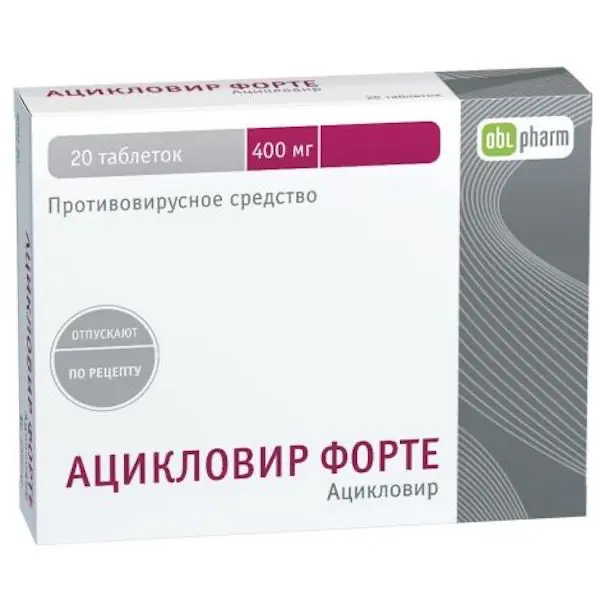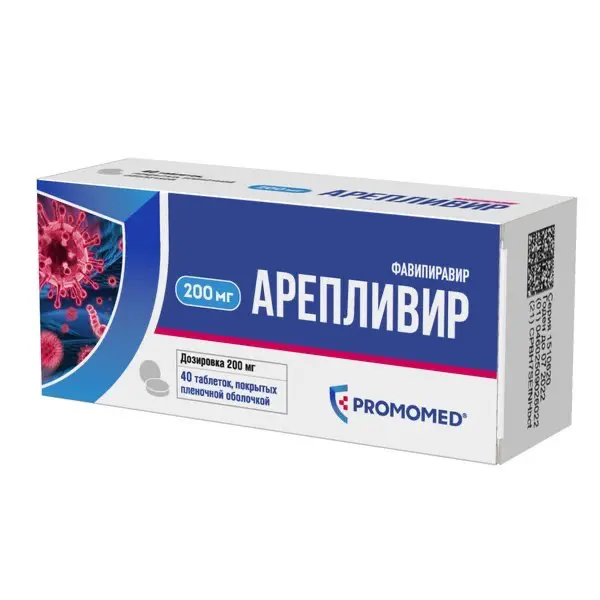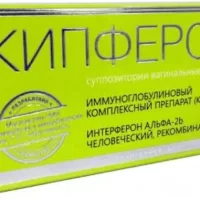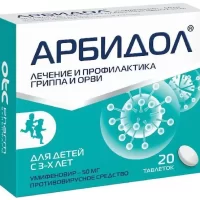Description
AcyclovirForte Pharmacodynamics
An antiviral drug, a synthetic analog of acyclic purine nucleoside, which has a highly selective effect on herpes viruses. A series of sequential reactions of acyclovir transformation into mono-, di- and triphosphate acyclovir takes place inside the virus-infected cells under the influence of viral thymidine kinase. Aciclovir triphosphate integrates into the chain of viral DNA and blocks its synthesis by competitive inhibition of viral DNA polymerase.
In vitro acyclovir is effective against herpes simplex virus – Herpes simplex virus types I and II, against Varicella zoster virus; higher concentrations are required for Epstein-Barr virus inhibition. In vitro acyclovir is therapeutically and prophylactically effective primarily against viral infections caused by Herpes simplex.
Indications
– Treatment of skin and mucous membrane infections caused by Herpes simplex viruses of types I and II, both primary and secondary, including genital herpes.
– Prevention of exacerbations of recurrent infections caused by Herpes simplex viruses type I and II in patients with normal immune status.
– Prevention of primary and recurrent infections caused by Herpes simplex viruses type I and II in immunodeficient patients.
– As a part of complex therapy of patients with severe immunodeficiency: in HIV-infection (stage of AIDS, early clinical manifestations and developed clinical picture) and in patients who had undergone bone marrow transplantation.
– Treatment of primary and recurrent infections caused by Varicella zoster (varicella zoster, as well as shingles – Herpes zoster).
Contraindications
Hypersensitivity to acyclovir, ganciklovir or any excipient of the drug.
Administration of the drug is contraindicated during lactation.
Childhood age under 3 years (for this dosage form).
Galactose intolerance, lactase deficiency, glucose-galactose malabsorption.
WITH CAUTION
Pregnancy; the elderly and patients receiving high doses, especially against the background of dehydration; renal dysfunction; neurological disorders or neurological reactions to cytotoxic drugs (including history).
PREGNANCY AND LACTATION
Acyclovir penetrates the placental barrier and accumulates in breast milk.
Administration during pregnancy is possible only in case when the expected benefits to a mother exceed the potential risk to a fetus. If it is necessary to take acyclovir during lactation, interruption of breast-feeding is required.
Dosage and administration method
- Oral. The drug is taken during or immediately after a meal with plenty of water.
Dosing regimen is set individually, depending on the severity of the disease. - In the treatment of skin and mucous membrane infections caused by Herpes simplex type I and II:
- Adults: the drug is prescribed on 200 mg 5 times a day for 5 days with 4-hour intervals during the day and with 8-hour intervals at night. In more severe cases the course of treatment may be prolonged by doctor’s prescription up to 10 days. As part of complex therapy at severe immunodeficiency, including a developed clinical picture of HIV infection (including early clinical manifestations of HIV infection and AIDS stage), after bone marrow implantation it is prescribed on 400 mg 5 times per day.
- For prophylaxis of recurrent infections, caused by viruses Herpes simplex type I and II, in patients with normal immune status and in case of relapse, it is prescribed 200 mg 4 times per day every 6 hours, the course duration from 6 to 12 months.
- For prophylaxis of infections caused by Herpes simplex viruses type I and II in adults with immunodeficiency, the drug is recommended to be prescribed 200 mg 4 times a day every 6 hours, the maximum dose is up to 400 mg acyclovir 5 times a day, depending on the severity of the infection.
- Children: For infection caused by Herpes simplex and for prevention of this infection in patients with weakened immune defenses, children over 3 years of age receive the same dose as adults.
- In the treatment of infections caused by Varicella zoster:
- Adults: the drug is administered 800 mg 5 times a day every 4 hours during the day and 8 hours apart at night. The duration of the course of treatment is 7-10 days.
- Children: In chicken pox, 20 mg/kg 4 times a day for 5 days (maximum single dose 800 mg), in children aged 3 to 6 years: 400 mg 4 times a day, over 6 years: 800 mg 4 times a day for 5 days.
- In treatment of infections caused by Herpes zoster, adults are prescribed 800 mg 4 times a day every 6 hours for 5 days.
- In patients with impaired renal function:
When treating and preventing infections caused by Herpes simplex in patients with creatinine clearance less than 10 ml/min, the drug dosage should be reduced to 200 mg 2 times daily at 12-hour intervals. - In treatment of infections caused by Varicella zoster in patients with creatinine clearance less than 10 ml/min it is recommended to decrease the preparation dose to 800 mg 2 times per day with 12-hour intervals; in creatinine clearance up to 25 ml/min it is administered by 800 mg 3 times per day with 8-hour intervals.





